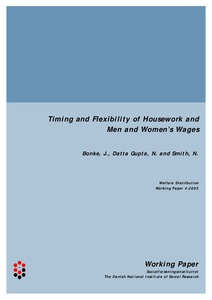Timing and flexibility of housework and men and women's wages
"This paper analyses the effect of housework on men and women’s wages in Denmark by estimating quantile regressions on Danish time use survey data from 1987, merged to register information on hourly wages and other labour market variables for each of the years 1987-1991. We find, as in U.S. stu...
| Main Authors: | , , |
|---|---|
| Institution: | ETUI-European Trade Union Institute |
| Format: | TEXT |
| Language: | English |
| Published: |
Copenhagen
2003
SFI |
| Subjects: | |
| Online Access: | https://www.labourline.org/KENTIKA-19294803124910120859-Timing-and-flexibility-of-hous.htm |
| Summary: | "This paper analyses the effect of housework on men and women’s wages in Denmark by estimating quantile regressions on Danish time use survey data from 1987, merged to register information on hourly wages and other labour market variables for each of the years 1987-1991. We find, as in U.S. studies, that housework has negative effects on the wages of women and positive effects on the wages of men, except at the high end of the conditional wage distribution. At the 90th quantile, housework has a positive effect on the wages of women and a negative effect on the wages of men, and in fact, high-wage men receive the largest wage penalty of doing housework.
Timing and flexibility of housework turn out to be more important than the level of housework, and women, particularly at the high end of the conditional wage distribution, who time their housework immediately before or after market work or engage in home tasks that require contiguous blocks of time are significantly penalized in terms of lower wages. These findings are even stronger for married and cohabiting couples and for workers on fixed timeschedules as opposed to workers with flexible time schedules which are part of a bargain with the employer." |
|---|---|
| Physical Description: | 34 p. Digital |

